
Friday December 14, 2018
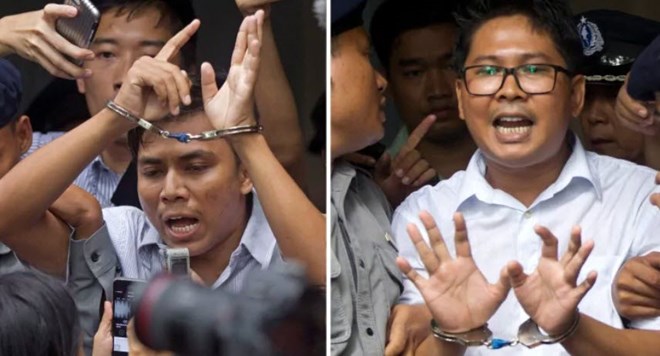
The worldwide war on journalism
These are difficult times for the media, in ways both large and small.
Today, the New York-based Committee to Protect Journalists released its annual tally of imprisoned reporters around the world, finding that 251 journalists are currently behind bars for the offence of doing their jobs.
While the number has declined slightly from last year's historical high of 262 prisoners, the trend is clear enough, write the report's authors: "the authoritarian approach to critical news coverage is more than a temporary spike."
Most of the jailed journalists face "anti-state" charges, like aiding and abetting banned political groups or terrorist organizations. But a significant portion — 28 people — are accused of spreading "fake news," compared to only nine such charges in 2016, and 21 a year ago.
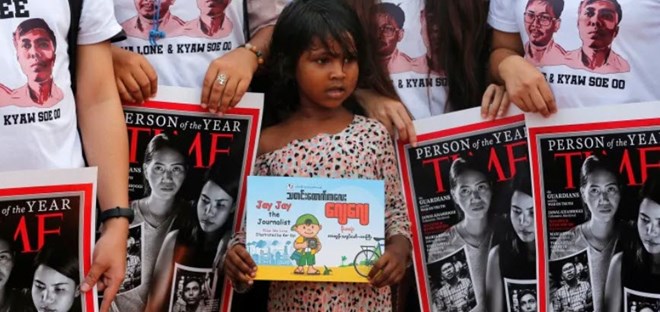
Activists gather for a rally to call for the release of imprisoned Reuters journalists Wa Lone and Kyaw Soe Oo in Yangon, Myanmar, on Wednesday, one year after they were imprisoned. (Myat Thu Kyaw/Reuters)
For the third year in a row, the touchiest media market remains Turkey, with 68 journalists currently in jail. A fact which suggests that President Recep Tayyip Erdoğan, who seems determined to punish all of those who were responsible for the murder of dissident columnist Jamal Khashoggi inside Saudi Arabia's consulate in Istanbul in October, might not be motivated by his admiration for the profession.
China holds the second-highest number of media prisoners, with 47 people in custody, followed by Egypt with 25 jailed reporters.
Saudi Arabia (16), Eritrea (16), Vietnam (11) and Azerbaijan (10) round out the list of main offenders, who collectively account for 77 per cent of all such imprisonments globally.
The only reason that 2018 wasn't yet another record-setting year for incarcerating journalists appears to be a regime change in Ethiopia. The new Prime Minister, Abiy Ahmed, has freed thousands of political prisoners from jail, including journalists, resulting in his country dropping off the CPJ bad-actor list for the first time since 2004.
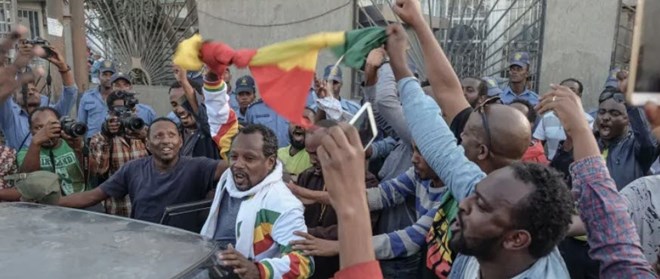
People react to the release of Ethiopian jounalist Eskinder Nega, who was given an 18-year prison sentence in 2012 on accusations of links to the banned Ginbot 7 group, from Kaliti Prison in Addis Ababa on Feb. 14. Ethiopia also dropped charges against a group of bloggers in a wave of prisoner releases and pardons. (Yonas Tadesse/AFP/Getty Images)
Earlier this week, Time Magazine made embattled journalists its 2018 "person of the year," highlighting the cases of two of those in the CPJ count, Wa Lone and Kyaw Soe Oo. The two Reuters reporters are now serving seven-year sentences in Myanmar after their investigation into a massacre of Rohingya Muslims enraged military authorities.
Today, there is official confirmation from the German government of another new arrest in Venezuela. Billy Six, a roving freelance correspondent for the ultraconservative weekly Junge Freiheit (Young Freedom), was picked up by police at his hotel in the Caribbean oil town of Punto Fijo three weeks ago, and now faces charges of espionage, rebellion and violating a security zone.
It's not the first time that the 31-year-old Six has found himself in a foreign jail. In 2013, he spent three months in a Syrian prison after surreptitiously entering the country to report on the civil war.

German journalist Billy Six is seen in Bucaramanga, Colombia. The parents of the freelance journalist are calling on Venezuela's President Nicolas Maduro to release their son, jailed since mid-November on suspicion of espionage and inciting rebellion. (The Associated Press)
By all appearances, it is becoming easier, not harder, for the world's strongmen to justify their punitive actions against the press. In large measure because the public doesn't seem to care so much.
A survey of U.S. high school students and teachers released last week found relatively broad support for the concept of a free press — 72 per cent of the teens say journalists "keep leaders from doing things that shouldn't be done." But there was a distinct sense of suspicion with regards to media motives, with 49 per cent of the students and 51 per cent of their teachers saying they don't trust the press to "accurately and fairly" report news.
That follows on a global poll, released at the beginning of 2018, which named the media as the world's least trusted institution. The Trust Barometer, produced annually by the PR firm Edelman, found 43 per cent distrust for the press overall, ranging from 30 per cent suspicion in Turkey to a high of 49 per cent in Canada.
(The Edelman survey asks questions in 28 world markets about government, NGOs, and all sorts of businesses, but notably doesn't include opinions about public relations professionals.)
Oddly, the Chinese expressed the most confidence in their reporters in the survey, with 71 per cent saying they trust them. Perhaps a reflection of the fact that not buying the party line tends to land one in jail, alongside those 47 media members.
In a far less consequential indication of the erosion of trust, word emerged this morning that U.S. President Donald Trump has cancelled the White House holiday party for the media.
He had made a grudging appearance at last year's gathering, delivering some brief words of welcome, but abandoned the past practice of posing for photos with each reporter in front of the Christmas tree.
Trump, who has frequently decried the "fake" and "failing" news media during his first two years in office, is still planning to invite some of his Fox News favourites to other White House parties.
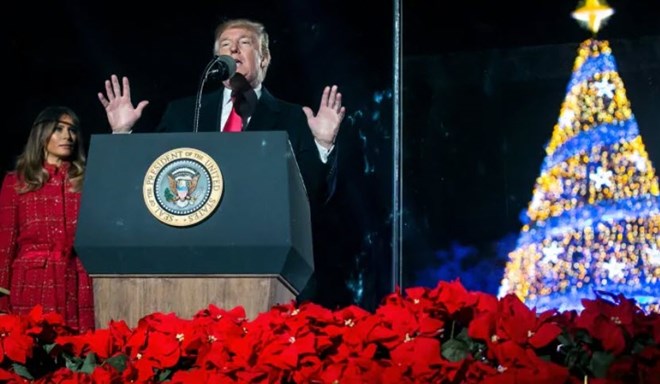
U.S. President Donald Trump participates in the 95th annual national Christmas tree lighting ceremony near the White House on Nov. 30, 2017, in Washington, D.C. This year, he has cancelled the traditional Christmas party with the White House press. (Al Drag/Getty Images)
But the president does have a new reason to distrust the press.
Yesterday, federal prosecutors in New York revealed that they have signed a non-prosecution agreement with American Media Inc., the publisher of the National Enquirer and other supermarket tabloids.
AMI and its head, David Pecker, who sat on the board of Canada's Postmedia until this past summer, now admit that they coordinated with Trump campaign staff to buy and bury unflattering stories about the married candidate's past affairs with a Playboy model and a porn star.
The deal will see the company and its employees, including Pecker — a longtime supporter and close friend of the president — cooperate for three years, testifying in court if required.
Trump has yet to comment.
Canada seems to be firmly lodged in the middle of a spat between two superpowers, writes Rosemary Barton.
One of the most interesting parts of this job is that with the constant twisting and turning of politics, it's often difficult to predict what you will be covering from one minute to the next. Political journalists have to quickly adapt to events and try to be specialists on a whole bunch of issues all at once.
This week, it was China.
But it's more complicated than that. More specifically, it was the volatile mix of U.S.-China trade relations combined with diplomatic relations between Canada, the U.S and China.
As of this writing there are now two Canadians who have been detained by Chinese officials for "endangering national security." It would appear both were taken into custody this past Monday.
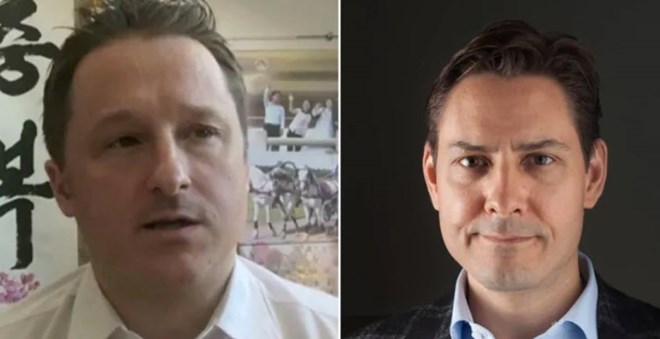
Michael Spavor and former Canadian diplomat Michael Kovrig were taken into custody earlier this week, Chinese officials say. (Associated Press/ International Crisis Group/Canadian Press)
Which means they were both detained while Huawei executive Meng Wanzhou was awaiting bail. The U.S. has said it wants Wanzhou extradited from Canada, where she was detained while visiting, on suspicion of violating sanctions against Iran.
Many former diplomats believe the two incidents are related: one in retaliation for the other.
If this is the case, and it's hard to see how it is not, what was a crisis involving two global powers now seems to involve Canada in a very direct way.
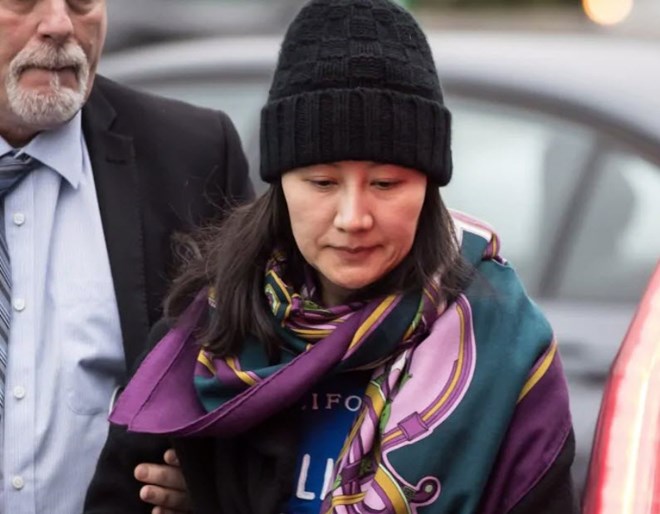
Huawei chief financial officer Meng Wanzhou, right, is escorted by a member of her private security detail while arriving at a parole office in Vancouver on Wednesday. (Darryl Dyck/Canadian Press)
Obviously, the government is working to get consular services in China for the two detained Canadian men — but there are broader questions for the government here, too:
How close should Canada get to China?
- Is trade that important and worth pursuing at high costs?
- And is this country being used by two other powers who are trying to settle their own issues?
- It's a complicated one.
At Issue will tackle it tonight: Chantal Hébert, Andrew Coyne and Althia Raj will be here. See you then.
- Rosemary Barton